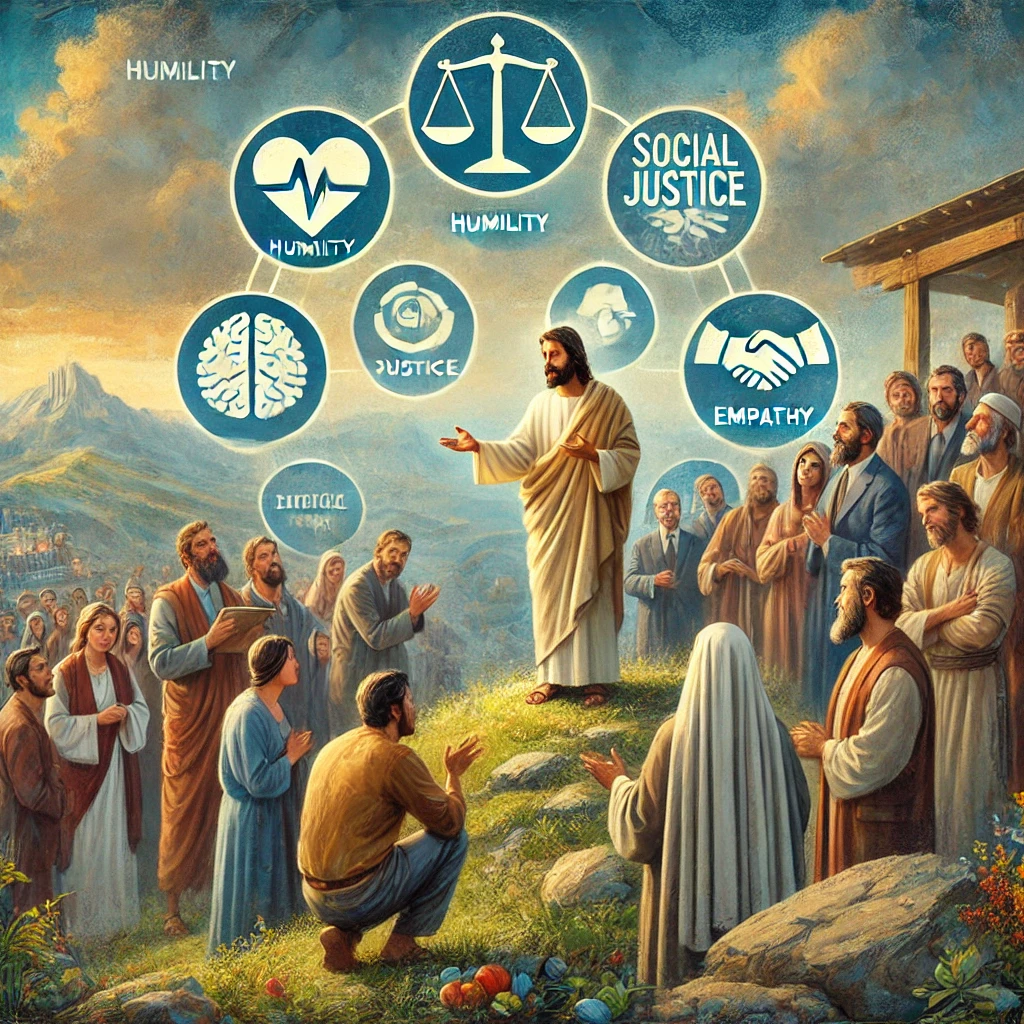
The Sermon on the Mount: An Analysis and Contemporary Relevance
Introduction
The Sermon on the Mount, found in the Gospel of Matthew chapters 5-7, is one of the most significant discourses in Christian theology. Delivered by Jesus, it encapsulates core ethical teachings and has been subject to extensive interpretation and analysis. This article explores the content and themes of the Sermon on the Mount and contextualizes its teachings to modern-day society.
Content and Themes
The Beatitudes
The Sermon begins with the Beatitudes, a series of blessings that describe the qualities of the kingdom of heaven (Matthew 5:3-12, New International Version). Each Beatitude begins with “Blessed are,” followed by a description of a virtue and a promise. For example, “Blessed are the poor in spirit, for theirs is the kingdom of heaven” (Matthew 5:3). These statements emphasize humility, mercy, and righteousness, offering a radical redefinition of what it means to be blessed (Davies & Allison, 1988).
Ethical Teachings
Jesus continues with ethical teachings that challenge the existing norms. He reinterprets the Law, urging his followers to seek a higher standard of righteousness. This includes turning the other cheek (Matthew 5:39), loving one’s enemies (Matthew 5:44), and avoiding hypocrisy in religious practices (Matthew 6:1-18). These teachings emphasize inner purity and genuine devotion over mere external compliance (Stott, 1978).
The Lord’s Prayer
The Lord’s Prayer (Matthew 6:9-13) is a model for prayer that highlights dependence on God, forgiveness, and the pursuit of God’s will. It underscores the relational aspect of prayer, calling God “Our Father” and seeking daily sustenance and moral guidance (France, 1985).
Exhortations on Anxiety and Judgment
Jesus addresses common human concerns such as anxiety and judgment. He advises against worry, pointing to God’s provision for all creation (Matthew 6:25-34). On judgment, he warns against hypocrisy and encourages self-examination before criticizing others (Matthew 7:1-5) (Luz, 2007).
Modern-Day Contextualization
Humility and Social Justice
In modern society, the Beatitudes’ emphasis on humility and mercy resonates with contemporary movements for social justice. Advocates for marginalized communities often embody the virtues described by Jesus, seeking justice, peace, and righteousness. The Beatitudes can inspire actions that promote equity and compassion in a world often marked by inequality and injustice (Hauerwas, 2006).
Ethical Living in a Secular World
The ethical teachings of the Sermon on the Mount challenge modern individuals to reconsider their moral frameworks. In a secular world, principles such as turning the other cheek and loving enemies may seem counterintuitive. However, these teachings offer a profound critique of retaliatory violence and suggest a path of nonviolent resistance and reconciliation, relevant to issues such as racial tensions and international conflicts (Wink, 1992).
The Role of Prayer and Spirituality
The Lord’s Prayer emphasizes dependence on a higher power and the importance of forgiveness, concepts that remain significant in contemporary spirituality. In an age of individualism and materialism, the prayer calls for a return to communal values and spiritual dependence, fostering a sense of shared humanity and collective well-being (Borg, 2006).
Addressing Anxiety and Mental Health
Jesus’s exhortations on anxiety are particularly relevant in today’s context of heightened stress and mental health challenges. By encouraging trust in divine provision and focusing on the present, these teachings offer a counter-narrative to the pervasive anxiety about the future. This perspective can complement modern psychological practices, promoting holistic mental health approaches (Keener, 1999).
Non-Judgmental Attitudes
The admonition against judgment invites modern individuals to adopt more empathetic and non-judgmental attitudes. In a culture often quick to criticize, this teaching promotes understanding and tolerance, essential for social cohesion and personal relationships (France, 1985).
Conclusion
The Sermon on the Mount remains a foundational text with profound ethical and spiritual implications. Its teachings, when contextualized to modern-day society, offer valuable insights into humility, social justice, ethical living, spirituality, mental health, and empathy. By engaging with these teachings, individuals and communities can foster a more compassionate and just world.
References
Borg, M. J. (2006). Jesus: Uncovering the life, teachings, and relevance of a religious revolutionary. HarperOne.
Davies, W. D., & Allison, D. C. (1988). A critical and exegetical commentary on the Gospel according to Saint Matthew (Vol. 1). T&T Clark.
France, R. T. (1985). The Gospel according to Matthew: An introduction and commentary. InterVarsity Press.
Hauerwas, S. (2006). The peaceable kingdom: A primer in Christian ethics. University of Notre Dame Press.
Keener, C. S. (1999). A commentary on the Gospel of Matthew. Eerdmans.
Luz, U. (2007). Matthew 1-7: A commentary on Matthew 1-7. Fortress Press.
Stott, J. R. W. (1978). The message of the Sermon on the Mount (Matthew 5-7): Christian counter-culture. InterVarsity Press.
Wink, W. (1992). Engaging the powers: Discernment and resistance in a world of domination. Fortress Press.



